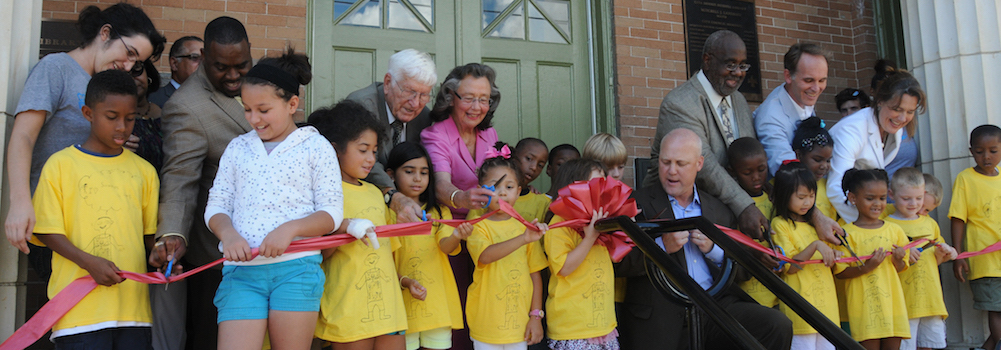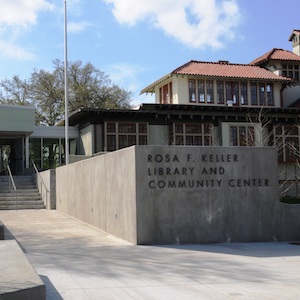 Children cut the ribbon on the reopening of the historic Cita Hubbell Library in New Orleans. Libraries can play a supportive role in community response and recovery from disasters. ©FEMA, 2013.
Children cut the ribbon on the reopening of the historic Cita Hubbell Library in New Orleans. Libraries can play a supportive role in community response and recovery from disasters. ©FEMA, 2013.
Recent natural disasters have prompted numerous local public service organizations—such as public libraries—to set aside routine activities and assume crisis-related roles to meet the needs of the community. Such entities do not focus on disaster management in their daily operations; yet they have deep understanding of local contexts and diverse expertise. Although these organizations often rise to the challenge of responding to disasters, their efforts have not always been recognized, and their capacities have not been systematically harnessed. For instance, in a study of libraries’ response to tornados in different communities across several Midwestern states, a local fire chief confessed that he had no idea that a library was involved in response and recovery efforts. A former Federal Emergency Management Agency director stated that FEMA did not have public libraries on the radar as a potential resource in disaster response.

The Rosa F. Keller Library was restored using FEMA funds after Hurricane Katrina. ©FEMA, 2012.
It is challenging to predict disaster-related responses of groups and organizations that do not routinely deal with emergency activities. Managers of these organizations have different perceptions and assumptions about their roles and capacity to assist in disaster situations as well as the appropriate forms their reactions might assume. However, to create disaster response plans that take greater advantage of the resources and capabilities of local organizations and civil society, there is a need to anticipate potential decisions and actions of these organizations and the extent to which their managers would be willing to address community needs during such events. This in turn could provide insight into ways to mobilize and incorporate potential disaster–related efforts systematically into a broader whole community response.
To advance knowledge in this area of study, I interviewed public library managers and directors in Hampton Roads, Virginia, and found that although most officials agreed that libraries should generally play a supportive role in disasters, they differed on the extent to which they believed libraries should be formally involved in planning and response. For many, the dynamics of change such as deviating from conventional roles while managing established routines seemed complex. Specifically, they perceived a conflict between seeking creativity and trying something new and capitalizing on familiar expertise. Accordingly, respondent narratives reflected both rigid and adaptable components and included both more defensive and more proactive characteristics. The differences in interpretation can be explained by library officials’ immediate policy environment, combined with how they identified with their public service role.
The Proactive Manager
Proactive library managers believe libraries should play a greater role in disasters. These managers do not always adhere to formal rules and procedures when making disaster-related decisions, but rather remain open to new possibilities. This can mean deploying the organization’s assets, at least temporarily, as if it were a first responder agency (e.g., providing space for medical care and shelter or organizing donation distribution operations). Public service for these managers entails adapting to changes and promoting and advocating for an awareness of library resources rather than maintaining traditional roles. Proactive managers are also fully engaged and find meaning in their managerial role. Having an entrepreneurial spirit, managers do not necessarily think of the organizational mission as narrowly defined. Instead, they might use their imaginations to think of ways to reposition the library and adapt to new demands. For example, one library director professed:
I think if I don’t do that [become proactive] people will not think of the library as a resource. They’ll just forget about the library and see the library as a warehouse of books and say, ‘wow, I didn’t know you had a meeting room with audio visual material, or you had this space that you could move people to if you needed to. Or you have vehicles available that could assist us with X or Y.’
Another librarian from that region went further and argued:
Libraries are flexible, because we are flexible, we can mold the library to fit the need—whatever that need might be. If we need to be a shelter, if we need to have extended hours or if we need to be a place for people to have community meetings.
This reflects an orientation to thinking and acting in less conventional ways when necessary and becoming more creative, innovative and available to the community in different capacities. Proactive managers understand the added value their libraries can provide in planning for emergency response and the importance of taking part in the planning process. They call for greater inclusion and seek to be “part of the team” and “at the table” for emergency planning. A library director argued:
I would rather be in the loop than out of the loop. I would rather be part of the solution than sit back and wait to be told what we could do. I’d rather be at the table for planning during the event and recovery phase so I can say ‘Hey, we can do that!’
These managers see the positive outcomes generated from being included in disaster-related decisions. The sense of recognition and legitimacy for their actions is associated with their expressed willingness to be fully engaged in collaborative efforts.
The Defensive Manager
Contrary to the proactive managers, defensive library managers are hesitant about libraries playing a role in community-based disaster response, claiming that libraries lack the necessary expertise and are short on resources. Public service for the defensive manager involves maintaining and protecting the long-term institutional identity of the public library rather than changing and transforming it. Accordingly, for them, a clear public duty is not to respond to new demands or search for innovation but rather to resist any library misuse. One manager from a regional library stated:
I see the library as doing more of what we always do. I don’t necessarily see libraries as a place that would shelter people. A building isn’t built for that. We don’t have showers, we don’t have kitchens, we’re very different from a place that would be used as a shelter. I don’t know that that’s a role we would play.
Indeed, members of organizations are more motivated to act on issues they believe will damage the organizational image, as their individual identity is tied to this image. Consequently, anything that is perceived as a risk to their organization and its image is considered a threat and triggers resistance. Control and stability are therefore key characteristics for the defensive manager and other organizations would probably have greater roles in emergency response.
Moving Forward
Local public service organizations such as libraries can play a greater role in local emergency networks. Management matters, however, and predicting which organization will be part of the network involves understanding managers’ perspectives. Do such officials have enough resources or autonomy to assume a new role? Do they identify (and agree) with this role? Do they view their organization as potentially performing this role? Managers may adjust differently to changes and uncertainty. While some may be more open to less-conventional directions others may be reluctant to assume a new role. Promoting a more proactive approach to disaster response involves recognizing these organizations and their managers ahead of time and inviting them to participate in disaster-related planning and decisions. Public officials should therefore guide local emergency authorities to identify variety of opportunities that local public service organizations such as public libraries can assist during disasters.
Michal Linder is currently a postdoctoral fellow at Ben Gurion University in Israel. Before that, she was employed by Virginia Polytechnic Institute and State University. Her research focuses on inter/intra-organizational behavior before, during, and after crises and disasters, with an emphasis on the range of managerial and community organizations' responses to emergencies.